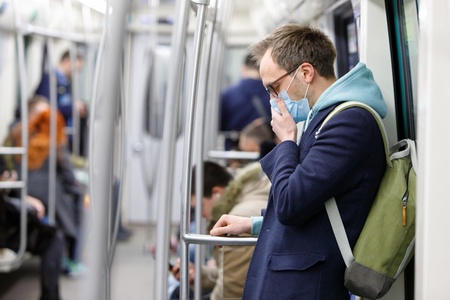Scientists at the University of Aberdeen are using a "game-changing" technology as they aim to produce a new type of face mask that is more effective in stopping the spread of Covid-19.
Microfluidics - also known as ‘lab-on-a-chip’ - is a technology that can be applied to prepare nanomaterials* that can be used to manufacture medical textiles such as face masks.
The technology can also be used to study microscopic transport – such as the aerosol particles through which Covid-19 can be transmitted via breathing.
Now, a multidisciplinary team of researchers from the University’s School of Engineering and Institute of Medical Sciences are aiming to use microfluidics to develop a new nanomaterial they hope will provide a more effective barrier to impede transmission.
Funded by a £11,602 NHS Grampian Endowment Research Grant, the project will test the effectiveness of microfibres containing silver nanoparticles – which are known to have antimicrobial and antiviral properties – in trapping and neutralising the virus.
To do so, scientists will develop a new experimental microfluidic device with micrometre-sized chambers and channels that offer the ability to test and prepare new nanomaterials.
The research is being led by Dr Alf Martinez-Felipe and Dr Wenbo Zhan from the School of Engineering, and Dr Claudiu Giuraniuc from the Institute of Medical Sciences. The project includes an industrial partnership with Specac Ltd, which will provide support by developing accessories that will allow researchers to better understand the effectiveness of new nanomaterials.
Dr Martinez-Felipe said: “There are several challenges regarding the development of efficient masks, such as the ability to reuse them safely, or the deactivation of the virus in the masks to avoid further propagation by misuse.
“The aim of this project is to prepare new materials to increase the efficiency of face masks turning them into active barriers for Covid-19.
“To do that we will prepare new silver nanoparticles embedded in microfibres, which will retain the aerosols containing Covid-19, and we will also measure the therapeutic potential of the materials by using the antiviral potential of silver nanoparticles.
“The key to doing this is our development of a new, versatile microfluidic device to test the effectiveness of these materials, which we will optimise using experimental and computational models. Microfluidics is regarded as a game-changing technology in terms of research into new nanomaterials, and we are very excited about the potential of this project.”
Dr Giuraniuc added: “This is innovative cross-disciplinary research that combine the research strengths of the Institute of Medical Sciences and School of Engineering, that will explore the potential of microfluidics in achieving progress in a critical area of healthcare.
“We expect that our findings will open new avenues for research, and ultimately lead to the introduction of new and more effective materials for use in the mass production of commercial face masks.”


